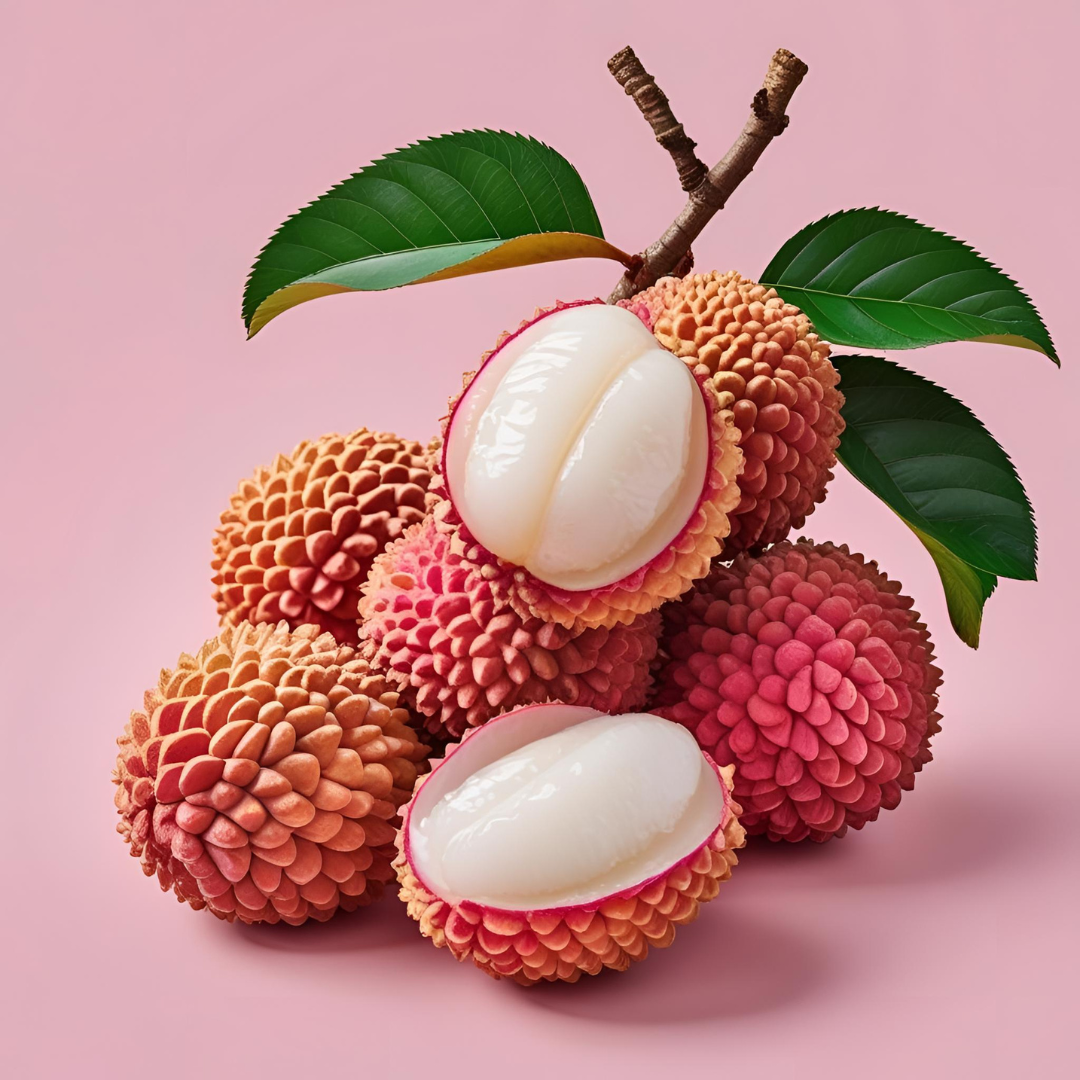1. Nutritional Profile of Lychee
A single serving of fresh lychee offers a vibrant array of nutrients with relatively few calories. Here’s what you get in about 100g (roughly 10 fruits):
-
Calories: 66–81
-
Carbohydrates: 16–17g (mainly natural sugars)
-
Dietary Fiber: 1.3–2.5g
-
Protein: 0.8–1.6g
-
Fat: Less than 1g
-
Vitamin C: 70–136mg (about 80–150% of daily value)
-
Copper: 10–30% of daily value
-
Potassium: 170–325mg (about 5–8% of daily value)
-
Folate & Vitamin B6: Small but significant amounts
-
Other Micronutrients: Iron, magnesium, phosphorus, zinc, manganese, and selenium in trace amounts
This composition makes lychee a low-calorie, high-antioxidant fruit that supports a range of bodily functions123.
2. Antioxidants and Anti-Inflammatory Power
Lychee’s greatest claim to fame may be its abundant antioxidants. The fruit is rich in vitamin C, providing more per ounce than most citrus fruits. It also contains a host of plant polyphenols, like:
-
Epicatechin and Rutin: Heart-healthy polyphenols
-
Proanthocyanidins and Anthocyanins: With anti-inflammatory and anti-aging properties
-
Flavonoids and Phenolic acids: Linked to cancer prevention and immune-strengthening effects
Together, these compounds help neutralize free radicals – unstable molecules that damage cells and that contribute to inflammation, aging, and chronic diseases including cancer and cardiovascular disease124.
3. Immune System Support
Lychee is one of the top fruit sources of vitamin C, which is vital for immune health. Just one serving can provide or exceed the daily recommended intake25. This nutrient strengthens the body’s defense against infections, supports white blood cell production, and helps rapidly repair tissues. Lychee also offers copper and iron, which are involved in immune cell function and oxygen transport.
Regular consumption of lychee can help the body fight off common colds, flu, and other infections more efficiently67.
4. Heart Health Benefits
Research links diets rich in lychee to better cardiovascular health. The benefits stem from several mechanisms:
-
Regulation of Cholesterol: Lychee’s flavonoids and polyphenols help lower “bad” LDL cholesterol while increasing “good” HDL cholesterol, reducing buildup in arteries and lowering risk for heart disease and stroke875.
-
Blood Pressure Control: With a fair dose of potassium and magnesium, lychee helps relax blood vessels and maintains healthy blood pressure, an important factor in preventing hypertension85.
-
Anti-inflammatory Action: Chronic inflammation is a leading contributor to heart disease. The antioxidants in lychee dampen inflammatory responses throughout the cardiovascular system.
5. Benefits for Digestion and Gut Health
Lychee contains dietary fiber, which adds bulk to stool and supports regular, comfortable bowel movements. A healthy gut microbiome is crucial for immunity and overall well-being, and lychee’s vitamin C and B vitamins help nourish gut bacteria67. The fruit’s water content and polyphenols further promote digestive wellness, helping to prevent bloating, constipation, and other digestive complaints7.
6. Blood Sugar Management
Although lychee is a sweet fruit, it has a moderate glycemic index. The fiber in lychee slows down sugar absorption, preventing sharp spikes in blood sugar. Polyphenols in the fruit have shown promise in boosting insulin sensitivity, which may aid in the management of diabetes879. Consuming lychee in moderation is suitable for most people, even those mindful of blood sugar, but portion control is still advised.
7. Skin Health and Anti-Aging Properties
Lychee’s high vitamin C content is essential for collagen production – a protein crucial for firm, elastic, and youthful-looking skin. Plant antioxidants further protect the skin from damaging free radicals, UV radiation, and inflammation. Regular consumption may help reduce wrinkles, fine lines, and skin dryness, helping to preserve a radiant complexion7105.
8. Weight Management
Low in calories and rich in water and fiber, lychee helps you feel full and satisfied while providing energy. This makes lychee a great option for those aiming to lose or manage their weight. Eating the fruit can quench your sweet cravings in a healthy way, helping to reduce overall calorie intake87.
9. Bone Health
Although not the richest source, lychee contains key minerals like magnesium, phosphorus, iron, manganese, and copper. These nutrients work synergistically to support strong bones, maintain bone density, and reduce the risk of osteoporosis. Regular inclusion of lychee, especially as part of a diverse diet, supports skeletal health across the lifespan711.
10. Eye Health
Vitamin C, polyphenols, and other antioxidants in lychee help protect the eyes from oxidative stress, a major factor in cataracts and age-related visual decline. Some emerging studies also suggest phytochemicals in lychee may slow down macular degeneration and promote healthy vision as you age7.
11. Liver Protection
Preliminary studies indicate that phenolic compounds like epicatechins and procyanidins in lychee may reduce liver cell damage by combating oxidative stress. Regular consumption is linked to reduced risk of liver diseases, such as fatty liver and hepatitis84.
12. Potential Anti-Cancer Effects
Several polyphenols in lychee – especially rutin, epicatechin, and proanthocyanidins – have demonstrated anti-cancer properties in laboratory and animal studies. They work by scavenging harmful molecules, inhibiting cancer cell growth, and supporting DNA repair. While human evidence is still emerging, diets rich in colorful fruits like lychee are associated with reduced cancer risk247.
Ways to Enjoy Lychee
Lychee can be eaten fresh, juiced, or added to fruit salads, yogurt, smoothies, or desserts. Dried lychees, often called lychee nuts, are a chewy, sweet snack with a more concentrated nutrient profile.
Tips:
-
Always remove the peel and large pit before eating.
-
Avoid canned lychee in heavy syrup due to added sugars; opt for fresh or frozen instead.
Safety and Precautions
-
Allergies: Rare but possible; symptoms include swelling, itching, or digestive upset.
-
Hypoglycin Content: Unripe lychee (rarely eaten) contains toxins that may cause hypoglycemia if consumed in excess, especially in malnourished children.
-
Moderation: As with all fruits, enjoy lychee as part of a balanced diet.
Conclusion
Lychee is a delicious treasure trove of nutrients and antioxidants, offering a multitude of health benefits. From boosting immunity and supporting heart health to promoting youthful skin and aiding digestion, lychee’s contributions go far beyond its sweet taste. Incorporate this tropical delight into your regular diet and enjoy not just its flavor, but its potent health-protective effects18274.
References used throughout this article:
-
1 WebMD: Lychee Fruit – Health Benefits and Nutrition
-
8 Tua Saúde: Lychee Fruit – 9 Benefits
-
6 Verywell Health: What Happens to Your Body When You Eat Lychee
-
2 Health.com: Health Benefits of Lychee Fruit
-
3 Foodstruct.com: Lychee Nutrition
-
5 HDFC Ergo: Nutritional Value and Health Benefits of Lychee
-
7 Redcliffelabs: Top Lychee Benefits
-
4 pH Labs: Lychee – “Dangerous” Fruit with Amazing Health Benefits
-
10 Medicover Hospitals: Nutritional Benefits of Lychee
-
11 Narayana Health: Health Benefits of Lychee
(Individual health conditions or dietary needs may require specific guidance. Always consult a medical professional for personalized advice.)
- https://www.webmd.com/diet/health-benefits-of-lychee-fruit
- https://www.health.com/lychee-benefits-8582934
- https://foodstruct.com/food/litchis-raw
- https://phlabs.org/education/lychee-the-dangerous-fruit-with-amazing-health-benefits
- https://www.hdfcergo.com/health-insurance/wellness-corner/nutritional-value-of-lychee
- https://www.verywellhealth.com/lychee-11776691
- https://redcliffelabs.com/myhealth/fruit/top-lychee-benefits-nutrition-health-and-wellness-explained/
- https://www.tuasaude.com/en/lychee-fruit/
- https://www.narayanahealth.org/blog/health-benefits-of-lychee/
- https://www.medicoverhospitals.in/articles/lychee-fruit-benefits
- https://www.narayanahealth.org/blog/health-benefits-of-lychee
- https://www.healthline.com/nutrition/foods/lychees
- https://www.medicalnewstoday.com/articles/lychee-fruit
- https://timesofindia.indiatimes.com/life-style/food-news/lychee-the-tiny-tropical-superfruit-with-health-benefits/articleshow/122127987.cms
- https://www.aprifel.com/en/nutritional-sheet/lychee/
- https://fppn.biomedcentral.com/articles/10.1186/s43014-024-00275-z
- https://nutrivore.com/foods/lychee-nutrients/
- https://www.healthmug.com/creation/unlocking-the-benefits-of-unpopular-fruits-lychee-for-your-overall-health/128







